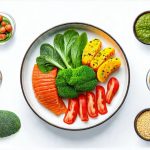The gut microbiome, often referred to as our “second brain,” plays an absolutely pivotal role in overall health. It’s involved in everything from digestion and nutrient absorption to immune function, mental wellbeing, and even chronic disease prevention. When this delicate ecosystem is disrupted – by factors like poor diet, stress, antibiotics, or illness – it can lead to a host of issues collectively known as “gut dysbiosis.” This imbalance manifests in symptoms ranging from bloating and gas to more serious conditions like irritable bowel syndrome (IBS), inflammatory bowel disease (IBD), and autoimmune disorders. The conventional approach often focuses on managing symptoms, but increasingly, attention is turning towards healing the gut at its root – addressing the underlying microbiome imbalances. Many people are now exploring dietary interventions as a key strategy for gut healing, and plant-based eating has emerged as a particularly promising avenue. This isn’t necessarily about strict veganism; it’s about prioritizing whole, unprocessed plant foods while potentially minimizing or eliminating those that can exacerbate inflammation or disrupt the gut ecosystem. The core principle is nourishing the beneficial bacteria within us with the fiber, phytonutrients, and other compounds abundant in plants, thereby fostering a healthier, more resilient gut environment. This article will delve into how a plant-based approach can contribute to faster gut healing, examining the mechanisms at play and offering practical insights.
The Power of Plant Fiber for Gut Health
Fiber is arguably the cornerstone of any gut-healing diet, and plant foods are its richest source. Unlike animal products which contain no fiber, plants provide a diverse array of fiber types – soluble, insoluble, resistant starch, and prebiotic fibers – each with unique benefits. – Soluble fiber dissolves in water, forming a gel-like substance that slows digestion, helps regulate blood sugar levels, and lowers cholesterol. Sources include oats, beans, apples, and citrus fruits. – Insoluble fiber adds bulk to stool, promoting regularity and preventing constipation. It’s found in whole grains, vegetables like broccoli, and fruit skins. – Resistant starch resists digestion in the small intestine, reaching the colon where it feeds beneficial bacteria. Foods rich in resistant starch include cooked and cooled potatoes, green bananas, and legumes. – Prebiotic fibers specifically nourish the beneficial bacteria in the gut, encouraging their growth and activity. Onions, garlic, leeks, asparagus, and Jerusalem artichokes are excellent prebiotic sources.
The fermentation of fiber by gut bacteria produces short-chain fatty acids (SCFAs) like butyrate, propionate, and acetate. These SCFAs aren’t just waste products; they’re crucial for gut health. Butyrate, in particular, is the primary energy source for colon cells, helping to maintain their integrity and reduce inflammation. SCFAs also strengthen the gut barrier – the single layer of cells that separates the digestive tract from the rest of the body – preventing “leaky gut” where harmful substances can enter the bloodstream. A diet lacking in fiber drastically reduces SCFA production, weakening the gut barrier and increasing vulnerability to inflammation and disease. A plant-based dietary pattern naturally provides a high intake of diverse fibers, supporting optimal SCFA production and fostering a robust gut lining. Those with sensitivities might benefit from understanding gut healing reverse food sensitivities.
Furthermore, plant fiber supports healthy motility – the movement of food through the digestive tract. Constipation can lead to bacterial overgrowth in the colon, exacerbating dysbiosis, while rapid transit time may not allow sufficient nutrient absorption. Fiber helps regulate bowel movements, ensuring a balanced and efficient digestive process. This creates an environment where beneficial bacteria thrive, and harmful ones are flushed out more effectively.
Addressing Inflammation Through Plant-Based Nutrients
Chronic inflammation is often at the heart of gut dysfunction. A plant-based diet is inherently anti-inflammatory due to its abundance of phytonutrients – naturally occurring compounds found in plants that possess potent health benefits. – Polyphenols, like those found in berries, green tea, and dark chocolate, are powerful antioxidants that protect cells from damage caused by free radicals. – Carotenoids, abundant in orange and yellow fruits and vegetables (carrots, sweet potatoes, mangoes), also have antioxidant properties and support immune function. – Glucosinolates found in cruciferous vegetables (broccoli, cauliflower, kale) are converted into compounds that help detoxify the body and reduce inflammation.
These phytonutrients don’t just combat inflammation; they actively modulate the gut microbiome. Some polyphenols, for example, can selectively inhibit the growth of harmful bacteria while promoting the proliferation of beneficial ones. This selective pressure helps restore balance to the gut ecosystem and reduces the production of inflammatory substances. By consistently consuming a diverse range of plant foods rich in phytonutrients, we provide our bodies with the tools needed to dampen inflammation and foster a healthier gut environment. Understanding the link between gut pain and additives can help identify additional inflammatory triggers.
It’s important to note that certain food sensitivities can contribute to gut inflammation. While a plant-based diet is generally anti-inflammatory, some individuals may react negatively to specific plant compounds or high FODMAP (fermentable oligosaccharides, disaccharides, monosaccharides, and polyols) foods. Identifying and eliminating these triggers – potentially through an elimination diet guided by a healthcare professional – can further reduce gut inflammation and promote healing.
The Role of Plant-Based Probiotics & Postbiotics
While probiotics are often thought of as supplements containing live bacteria, we can also obtain them naturally from fermented plant foods. – Sauerkraut, made from fermented cabbage, is rich in lactic acid bacteria that support a healthy gut microbiome. – Kimchi, a Korean staple made from fermented vegetables (typically napa cabbage and radishes), offers similar probiotic benefits. – Kombucha, a fermented tea drink, provides a source of probiotics along with antioxidants and other beneficial compounds.
These plant-based fermented foods not only introduce live bacteria into the gut but also contribute to the production of postbiotics – metabolic byproducts produced by gut bacteria during fermentation. Postbiotics like vitamins, SCFAs, and enzymes offer health benefits beyond those provided by probiotics themselves. They can strengthen the gut barrier, reduce inflammation, and enhance nutrient absorption. Incorporating fermented plant foods into a diet isn’t just about adding beneficial bacteria; it’s about enriching the gut ecosystem with the compounds needed for optimal function. For some people, anxiety surrounding food is common; learning how to handle the fear of eating with a sensitive gut can be helpful.
However, it’s crucial to understand that probiotic supplementation doesn’t always guarantee results. The effectiveness of probiotics depends on factors like strain specificity, dosage, and individual gut microbiome composition. Focusing on a plant-based diet rich in prebiotic fiber creates an ideal environment for existing beneficial bacteria to thrive, often proving more effective than simply introducing new strains through supplements.
Minimizing Gut Irritants with Plant-Based Choices
While increasing plant intake is crucial, equally important is reducing or eliminating foods that can exacerbate gut issues. A typical Western diet, heavy in processed foods, refined sugars, and animal products, often contains numerous gut irritants. – Processed foods are typically low in fiber and high in additives, artificial sweeteners, and unhealthy fats, all of which can disrupt the gut microbiome and promote inflammation. – Refined sugars feed harmful bacteria in the gut, leading to dysbiosis and increased intestinal permeability. – Animal products, particularly red and processed meats, can contribute to inflammation and the production of TMAO (trimethylamine N-oxide), a compound linked to cardiovascular disease and gut dysfunction.
A plant-based diet naturally minimizes these irritants. By focusing on whole, unprocessed plant foods – fruits, vegetables, legumes, whole grains, nuts, and seeds – we significantly reduce exposure to substances that can disrupt the gut ecosystem. This allows the gut to rest, repair, and rebuild its natural defenses. It’s not always necessary to eliminate all animal products entirely; a reduction in intake can often yield significant benefits.
Furthermore, some plant foods themselves can be problematic for individuals with specific sensitivities. – High-FODMAP foods (onions, garlic, apples, pears) can cause bloating, gas, and discomfort in people with IBS or other gut disorders. An elimination diet guided by a healthcare professional can help identify FODMAP triggers. – Lectins, found in legumes and grains, can be difficult to digest for some individuals and may contribute to inflammation. Proper preparation methods like soaking and sprouting can reduce lectin content. The key is to personalize the plant-based approach, identifying and eliminating foods that trigger individual symptoms while embracing those that support gut health. Sometimes, these sensitivities can even lead to can gut sensitivities cause panic attacks?.
Ultimately, adopting a plant-forward dietary pattern isn’t just about what we add; it’s about strategically minimizing factors that hinder gut healing and maximizing those that promote a thriving microbiome. It’s an investment in long-term wellbeing, creating a foundation for optimal physical and mental health. Furthermore, understanding the science behind gluten and the gut is helpful when personalizing your diet. Finally, remember that can caffeine worsen gut inflammation?.


















